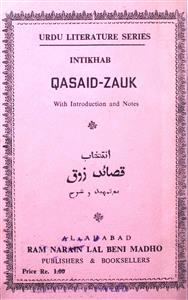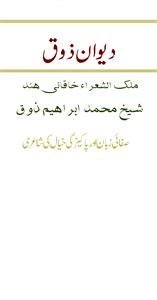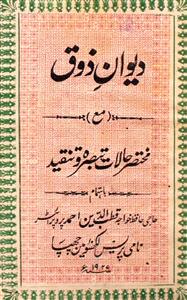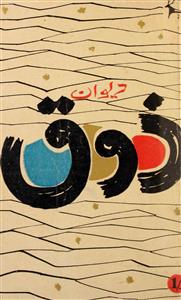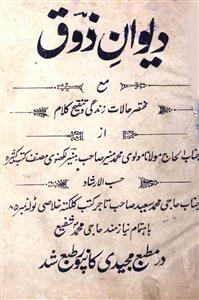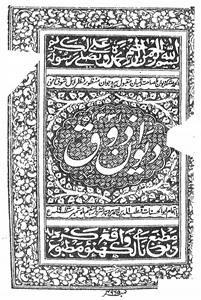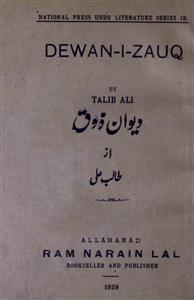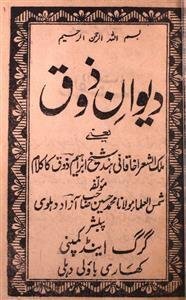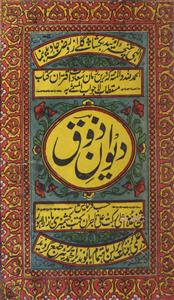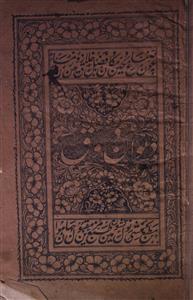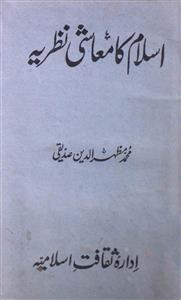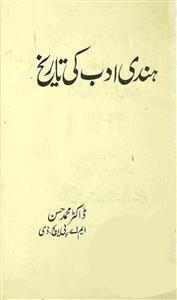 For any query/comment related to this ebook, please contact us at haidar.ali@rekhta.org
For any query/comment related to this ebook, please contact us at haidar.ali@rekhta.org
About The Book
قصیدہ گوئی کے میدان میں ذوق کا ایک اعلیٰ مقام ہے۔ ذوق نے اپنی قصیدہ نگاری کی مشعل کو سودا کے چراغ سے روشن کیا ہے ۔ ذوق جب اُنیس سال کے تھے اسی وقت سے وہ ایک مستند قصیدہ گو شمار کئے جاتے تھے۔ ذوق نے اپنے قصائد میں شاعری کے تمام لوازمات کو بڑی مہارت حسن اور قرینے کے ساتھ سمویا ہے۔ وہ اپنے قصائد محض مدح سرائی کے لئے نہیں کہتے بلکہ بعض صورتوں میں وہ مقصدی پہلووں پر بھی زور دیتے ہیں۔ اس طرح وہ قصائد سے اصلاح ِ احوال کا کام بھی لیتے ہیں۔ وہ شگفتہ پیرائے میں دنیا کی بے ثباتی ، اشیاءک ی جزئیات نگاری اوراخلاق و اطور کی صحیح صحیح نقشہ کشی اور مصوری کرنے کی بھی اپنے تئیں پوری پوری کوشش جاری رکھتے ہیں۔ اور حتیٰ الامکان ان کی کوشش یہی ہوتی ہے کہ بیان میں شستگی اور سلاست برقرار ہے مگر اس سلاست میں بھی وہ موتی پرو دیتے ہیں۔ زیر نظر کتاب ذوق کے سات قصائد کا انتخاب ہے جس کے شروع میں تعارف اور آخر میں فرہنگ شامل ہے۔
About The Author
Mohammad Ibrahim Zauq, a poet with a strong grasp of Urdu language and idiom, and a master of masters like Mohammad Hassan Azad in prose and Dagh in ghazal, after a period of neglect for a while, is once again showing his mettle to his deniers. In the reign of King Bahadur Shah Zafar, Zauq, who was awarded the title of Malik al-Shu'ara, was considered to be one of the most important poets of his time. But after his death, as times changed, he was rejected as a mediocre poet.
Sheikh Muhammad Ibrahim Zauq's father Muhammad Ramzan belonged to a neo-Muslim Khatri family. His family was far from knowledge and literature. Zauq was admitted to the madrassa of Hafiz Ghulam Rasool. Ghulam Rasool himself was a poet and used the pseudonym Shauq. It was in his company that Zauq developed a passion for poetry. From time to time, he used to revise his early ghazals and the pen-name Zauq was also suggested to him. Sometime later, Zauq entered Maulvi Abdul Razzaq's madrassa. Here his childhood friend Mir Kazim Ali Baqarar was his classmate. Baqarar was Nawab Razi Khan, Vakil Sultani's nephew and Baidar Shah Zafar's special employee. He was only Crown Prince till that time, King Akbar Shah Sani. And, it was through him that Zauq reached the fort.
Poetry is a subtle art and the inclination towards poetry is the proof of the nobility of taste. After reaching the fort, Zauq started attending regular court poetry recitals. Pleased with one of his poems, Akbar Shah Sani addressed him as Khaqani-e-Hind. Soon he became very popular in the city with this appellation. After Sauda, Zauq was recognized as the second greatest Urdu epic writer. The atmosphere of his poems is scholarly, literary and technically admirable. Soon his fame and popularity spread throughout the city. It spread until his teacher Shah Naseer became jealous of him. He used to criticize Zauq's poems but Zauq never cared for him. The public popularity of Zauq was the answer to all the criticisms. From the government of Crown Prince Mirza Abu Zafar (Bahadur Shah) he used to get a monthly stipend of Rs. 4 (remember that at that time Zafar himself had a stipend of Rs. 500 per month) which later became Rs. 100. Despite all wealth and fame, such was his simplicity that despite having many houses, he lived in a small house all his life.
Zauq’s contemporary rivalries with Shah Naseer, Ghalib, and a few others are extensively discussed in various biographical accounts and memoirs. But as far as his poetry concerns, he was a poet of Ghazal. His countless poems have become proverbs to this day and are on the tongues of the people. He has worked with great dexterity and the metaphorical style fills the effect in his poems. Simple language, correctness of idiom and quickness of closure are the common qualities of Zauq’s ghazals. He uses language that is in line with everyday life and does not confuse the listener.
 For any query/comment related to this ebook, please contact us at haidar.ali@rekhta.org
For any query/comment related to this ebook, please contact us at haidar.ali@rekhta.org
